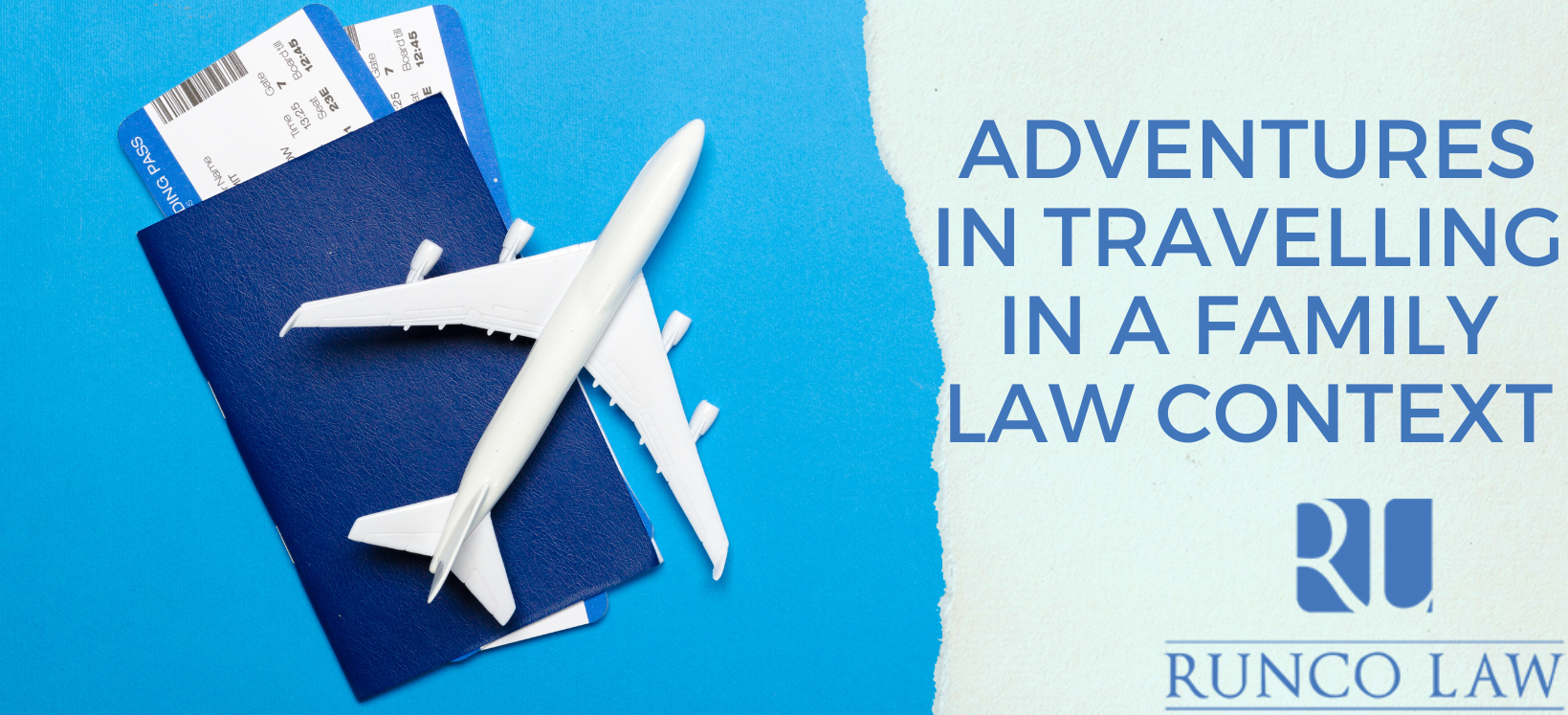There is a famous quote from Lao Tzu, an ancient Chinese philosopher, which says “a journey of a thousand miles begins with a single step.” How profound. But I would bet that he did not have to deal with former/ex-partners or spouses who were reticent or conflictual in allowing him to go on a journey in the first place.
As many of us are about to start the summer of 2022 and head out of town for travel, I usually get a flurry of requests from clients to ask the other side for permission to travel, or from opposing lawyers, seeking same on behalf of their clients and their child/children. When clients ask me for my thoughts on the matters, I am generally in favour of allowing people to travel as a family (new, blended, or otherwise), and as they wish, but it is not a blanket “sure, go ahead.” There are some questions to ask and some concerns to be aware of. This blog will address some, and as with many of my other blogs, you will better understand why many lawyers are guarded about such inquiries, and will respond with “it depends.”
As with all my blogs, this one will not be a definitive list for all considerations, but it is a good starting point.
Questions to Ask
- Where are you going?
If you former partner/spouse asks you for permission to travel, or if you are the one asking for permission, one of the first questions to ask/answer is where you will be going with the child/children? The reason this is important is in the context of the party going away, their citizenship/residency status in Canada, and any risk of not returning.
If the party seeking to travel is a lifelong resident/citizen of Canada, has a job and home here, and their entire life is based here, then, generally speaking, I am not terribly concerned. On the contrary, if the client’s connection to Canada is tenuous, no stable job, income insecurity, or other wise is tied to another country, be extremely cautious about allowing foreign travel. Even if the destination country is not the party’s original country, what’s to stop them from jumping on another plane in that destination country?
The same is true even if the travelling parent wants to go to another province in Canada. We often see/hear of cases where, due to a mobility/relocation order, one party has moved out west, and are entitled to have the entire summer with the child, but then refuse to return the child at the end of the summer. Be cautious, abide by the court order and allow the travel, but if you have exceptionally good reasons to believe that the other side is planning something nefarious, you will need to bring a motion to address your concerns before they go. In such cases, please seek legal advice immediately!
- Is the country a signatory to the Hague convention?
This segues into my next consideration. Canada, along with many other countries, have signed a treaty (the Hague Convention) that they will respect and enforce custody/access orders in the country of the other signatories. So, if a Canadian child is abducted to the US, since we are both signatories, the US authorities will assist Canadian authorities in seeking and returning that child to Canada (a little over-simplified, but it is sufficient for now). What happens if the country the person wants to go to, or ends up going to, is not a Hague signatory? If the child ends up in that country, the options for the Canadian parent are extremely limited. You are subject to the laws of that country, and they will likely not care what a Canadian family court orders says.
- What is the purpose of the travel?
Once again, this question seems innocuous, but it must be asked. If you are planning a trip to Disney World, say so. If the other side is panning a Caribbean vacation during March break, have them say so. If the destination appears to be “out of the ordinary” then ask questions, or if you are the one looking to travel, provide an explanation. Eliminate the concern. If you’ve wanted to travel to Iceland and have no connection to the country, explain (or get the explanation for) the reasoning for the trip. If you want to go to the Middle East as you always wanted to visit “the holy lands,” explain this. If there is a sports tournament going on over the Christmas holidays, don’t assume that “everyone knows about the big tournament in Boston, or Chicago, or elsewhere” during that time.
At the end of the day, you want to assure the other parent, or the other needs to assure you, that the purpose of the trip is a legitimate one, and that it is not a ruse for something else. When doing so, look at your conduct or the conduct other party – are there any red flags over the past year that need to be considered before it’s too late?
- How long are you going?
Once again, common sense should prevail. A week to two weeks is not out of the ordinary. For example, a weekend trip across the border is quite common, as a one-to-two-week trip to Mexico or the Caribbean in the winter is normal. But beyond this, a vacation should not last an extensive period of time, especially when young children or school-aged children are involved. School routines should not ordinarily be interrupted, although a day or two missed is not the end-all-and-be-all. Look at the destination and the amount of time being sought. There’s also a difference between keeping a 1st grade child out of school for a week as opposed to an 8th or 12th grader, where the impact on graduation is an issue. As well, extended summer vacations to Europe, Asia, Africa, or elsewhere is not uncommon, but always be mindful of the destination and the duration of the trip together.
As well, in such circumstances, be extremely cautious of a short trip to a foreign country that is not a Hague-convention-signatory and/or where the parties have significant ties to the country. Sometimes the length of the trip is a ruse and there is no intention to ever return from the trip.
- Itinerary
This is often one of the questions that gets missed. The travelling party does not need to provide a minute-by-minute outline of the trip, but some indication of where the travelers will be going is essential, especially if it involves crossing into other states or countries for a short period of time.
Another question to ask is whether the travelling parent is going to have the children participate in and/or exposed to activities that may be considered dangerous, e.g. sky-diving, parasailing, sea-doo-ing, ski-doo-ing, hand-gliding, white-water rafting, etc. This list is not extensive, and consideration must be made to the age of the children and their experience/inexperience with the activity proposed. It is important to understand that in many of these cases, the “custodial” parent will be asked to sign a waiver/liability form, so please be aware of this possible consideration and whether the travelling parent has authority to sign such a form. Being a “parent” may not be enough.
This may be the same with medical travel insurance. Make sure you read the fine print – you don’t wont to be on the hook for tens of thousands of dollars because you do not have the proper insurance for the child, should they become sick or injured on the trip.
- Travel Permission
Not to be so blunt, but usually when one parent is travelling, they are not looking to other person for permission, they are simply telling them what they are doing. Nonetheless, it is important to consider the formality of having a travel permission form in hand.
If they have addressed all the other concerns above, then it is important to commit same to writing. The Canadian Department of Justice recommends the completion of a travel consent form that would be presented at border crossings to advise authorities that the other parent has consented to the travel and that this is not an attempt to abscond with the child. Please visits http://www.travel.gc.ca/letter. Remember that this is a Canadian document and is recognized in Canada but each country a parent is travelling to may have its own form, so do some research into whether that country needs its own form signed.
Some people do not bother with the formality, and rely on a simple handwritten note by the non-travelling party. As with any such “do it yourself” documents, there are many stories of border guards who will not recognize same. The more you try to argue with them, the deeper they may dig in. It is important to understand that they need to be sure that a child is not being abducted, and if they have a sniff that something does not look right, they will err on the side of caution. They will not care about your trip, or about how much you or others paid, or any law suit you plan to launch against them. It’s a simple form, get it completed, and where possible, get it notarized or commissioned by lawyer.
It is also recommended that you bring a copy of the court order for custody/decision-making or for access/parent-time. Please remember that they will want an original copy of the red-sealed order, and not the minutes of settlement or the judge’s endorsement,
Conclusion
After an almost 3-year hiatus of travelling due to Covid-19, the ability to travel once again is a joy for many to exercise. But it is not an absolute right. There are conditions with travelling, and I hope this blog has drawn your attention to some of the considerations when travelling, especially if you were involved in a family law dispute. With that, I wish you a bon voyage, and don’t forget to apply the sunscreen liberally and often!

